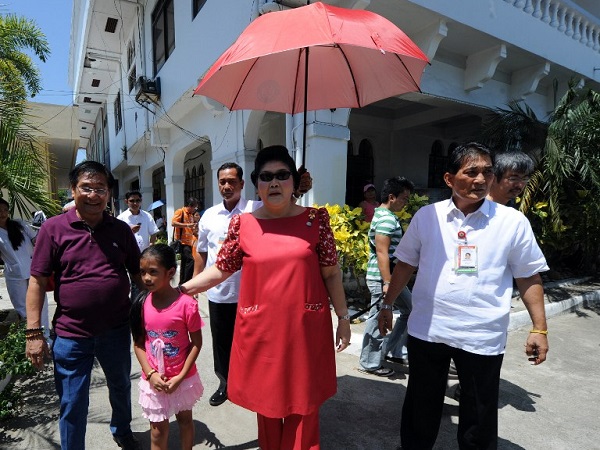
This photo taken on May 5, 2013 shows Philippine former first lady Imelda Marcos (C) walking with a girl as she arrives for a campaign trail in Banna town, Ilocos norte province, north of Manila. At an age when many others are in nursing homes, the tireless 83-year-old Imelda Marcos is on the campaign trail, aiming to keep her seat in parliament in next week’s mid-term elections and continue her family’s remarkable political resurrection. AFP/TED ALJIBE
PAOAY, Philippines—It is close to midnight and Imelda Marcos is dancing in a trademark pink butterfly gown at a small town fiesta with adoring voters who still revere her dead dictator husband.
At an age when many others are in nursing homes, the tireless 83-year-old is on the campaign trail, aiming to keep her seat in Congress in next week’s mid-term elections and continue her family’s remarkable political resurrection.
“It’s funny because the older I become the more committed I am and the more I feel I can do it,” Marcos told Agence Fance-Presse on the weekend from the family’s ancestral home in the rural north of the country before heading to the nearby fiesta.
The widow of Ferdinand Marcos is seen as a certainty to win after first being elected to Congress in 2010, representing half of Ilocos Norte province whose voters have stayed loyal to the family throughout decades of tumultuous politics.
But the matriarch has eyes on a bigger prize — a return to Malacañan Palace as first mother via her son, Ferdinand Marcos Jr., who is sitting comfortably in the Senate and eyeing a 2016 run for the top job.
“You always have dreams for your children, and the more they can serve the people, the better,” Marcos said when asked about her charismatic son’s well-known presidential ambitions.
Ferdinand Jr., popularly known by his nickname, “Bongbong”, appears well-positioned for a presidential run after one in three voters nationally elected him to the Senate for a six-year term in 2010.
Their political fortunes have come a long way from 1986, when millions of people took to the streets in a bloodless “people power” revolution to end the patriarch’s two-decade rule of the country and force them into US exile.
Former president Ferdinand Marcos, his wife and their cronies were accused of stealing billions of dollars. Human rights campaigners said thousands of the regime’s critics were murdered or jailed, while martial law also muzzled the press.
Imelda Marcos’s giant shoe collection, jet-setting lifestyle and other extravagances — while the majority of the population endured crushing poverty — came to symbolize the excesses of her husband’s rule.
But the current government is winding down a global wealth hunt for the embezzled Marcos billions, and the family has been able to beat every charge of corruption against it.
The Philippines is run by a remarkably small number of political families and, in many respects, the Marcos family has been welcomed back into the elite fold.
One of the few consolations for the family’s critics is that Ferdinand Marcos died in disgrace while exiled in Hawaii, three years after the revolution.
At the fiesta in Paoay town on Saturday night, Imelda Marcos evoked her glory days as she paraded around a dance floor in a pink evening gown with bare shoulders and signature puffed sleeves.
In between dance numbers on the sultry night, a young male politician running for a local post sat next to her and furiously wielded a red fan.
Other politicians stood on stage to publicly express their support, and she delivered the headline speech of the night — albeit a rambling one that betrayed her advancing years.
Early the next day she began travelling around the district showing off her public support to a group of international and local journalists via a series of well-orchestrated campaign events.
At each town the media were guided into “mothering centers”, small concrete-walled clinics she has had built across her district offering a hodge-podge of services from medical care to handicrafts training.
During stops she cradled babies and shared native cakes with old women. Two aides carrying red shoulder bags handed out superhero plastic toys and dolls to other children, and money to a few adult supporters.
Honesia Aknam, an elderly woman with blackened stumps for teeth, embraced her political idol in the hill town of Nueva Era and later gushed as she showed to AFP a P500 ($12) bill that she said a Marcos aide slipped into her hand.
“I’ve not seen her for a while so I came here. She looks beautiful still, like a young woman,” Aknam said.
Catholic priest Danilo Laeda said the family was genuinely liked in the dry, sun-baked region due to the enduring political largesse of good roads and other infrastructure in the Marcos era.
“And they see Bongbong as the personification of the father,” Laeda, the parish priest of San Nicolas town, told AFP.
However, Laeda acknowledged that the air was rife with rumors that the Marcos family was giving out lots of money directly to voters to buy their support for allies seeking local elective posts.
Rival candidate Ferdinand Ignacio claims Imelda Marcos illegally spent huge pork barrel funds and farm levies collected from tobacco products ahead of the vote for pet projects such as the “mothering centres” and buses for farmers.
“They (Marcoses) are not popular, they are just moneyed people. They buy people here, that’s why they’re winning the elections,” Ignacio, a 49-year-old lawyer from Paoay, told AFP.
Marcos dismissed her rival’s allegations of vote-buying, illegal use of government funds and general corruption.
“I always take criticism as some kind of advice, but sometimes it’s ridiculous advice or criticism…. we don’t wallow in what is not positive,” she said.